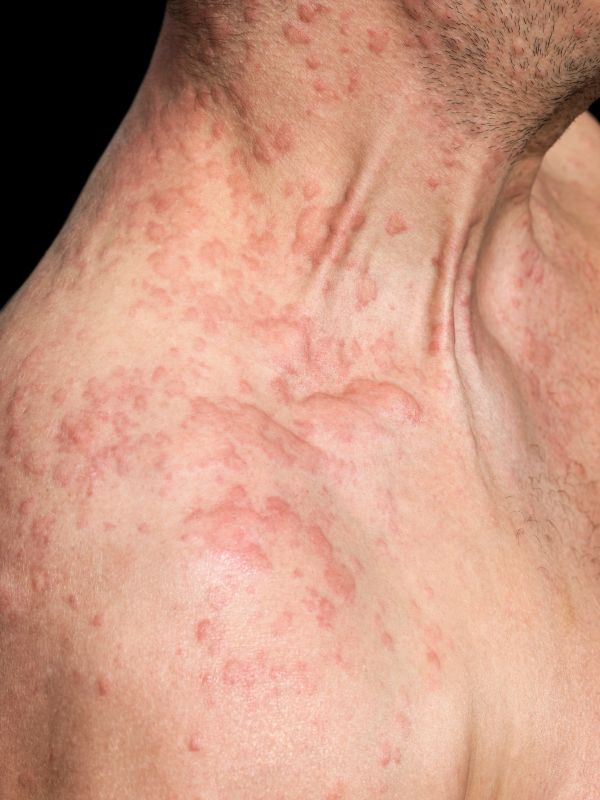Top Class Actions’s website and social media posts use affiliate links. If you make a purchase using such links, we may receive a commission, but it will not result in any additional charges to you. Please review our Affiliate Link Disclosure for more information.

The new study was published in the Journal of the American Medical Association (JAMA) in their June 2014 issue. The study followed 708 cases of both SJS and TEN, including 127 children in their sample size. The researchers made the grim discovery that overall, roughly 18 percent of cases died in the hospital or shortly after release from complication. However, researchers also uncovered another problem.
The researchers found that once a person suffers from SJS or TEN, they are much more likely to suffer a recurrence of the reaction, particularly when they take the drug that triggered their first bout of SJS. The researchers surmised that since SJS and TEN are relatively rare, physicians may not realize that a person is likely to suffer from a recurrence, and may not even realize that a patient has had SJS or TEN.
SJS is an autoimmune reaction. Autoimmune reactions are situations where the immune system, the system that normally fights off infection, goes haywire and attacks the body. In the case of SJS, the body attacks its own skin.
Initially, patients experience flu-like symptoms such as chills, fever, and widespread muscle aches. These same symptoms show up in many diseases, since they can be the result of the immune system gearing up to fight infection, under normal conditions. However, in SJS, the symptoms rapidly escalate to a painful rash with blisters, then sores and ulcers. The damage can cover the skin and spread to the mucus membranes. In some cases, it can also include the eyes and even the internal organs.
The most extreme case can escalate to an even-more-dangerous form of the disorder called Toxic Epidermal Necrolysis (TEN). TEN is an extreme case of SJS. In TEN, patches of the skin die and slough off, leaving burn-like wounds.
The ravages of SJS and TEN so closely resemble burns that emergency medical care professionals often resort to treating TEN in burn wards.
The mortality rate for SJS varies with the severity of the reaction. When SJS becomes TEN, the morality rate can be 40 percent — higher than some strains of the Ebola virus.
Almost all cases of SJS and TEN are the result of a person taking a prescription or over-the-counter drugs. It is very difficult to determine who will get SJS from what drugs. In many cases, there appear to be genetic factors that increase the risk of SJS, but many people with the genes in question never get SJS and many people with SJS do not have identifiable genetic risk factors.
Drugs linked to Stevens Johnson Syndrome include the antibiotic Zithromax, the anticonvulsants Dilantin and Lamictal, and even over-the-counter medications such as acetaminophen (Tylenol) and ibuprofen (Advil), and more.
In general, SJS lawsuits are filed individually by each plaintiff and are not class actions.
Do YOU have a legal claim? Fill out the form on this page now for a free, immediate, and confidential case evaluation. The attorneys who work with Top Class Actions will contact you if you qualify to let you know if an individual lawsuit or class action lawsuit is best for you. Hurry — statutes of limitations may apply.
ATTORNEY ADVERTISING
Top Class Actions is a Proud Member of the American Bar Association
LEGAL INFORMATION IS NOT LEGAL ADVICE
Top Class Actions Legal Statement
©2008 – 2024 Top Class Actions® LLC
Various Trademarks held by their respective owners
This website is not intended for viewing or usage by European Union citizens.
Get Help – It’s Free
Help for Victims of Stevens Johnson Syndrome
If you or a loved one were diagnosed with Stevens Johnson Syndrome (SJS) or toxic epidermal necrolysis (TEN) after taking a prescribed or over-the-counter medication, you may be eligible to take legal action against the drug’s manufacturer. Filing an SJS lawsuit or class action lawsuit may help you obtain compensation for medical bills, pain and suffering, and other damages. Obtain a free and confidential review of your case by filling out the form below.
An attorney will contact you if you qualify to discuss the details of your potential case at no charge to you.
Oops! We could not locate your form.












